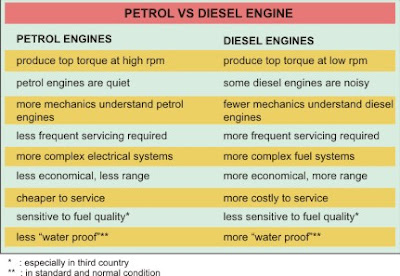A Diesel Vs A Petrol Engine
The type of fuel your car runs on, among other things, is among the first things to consider in the car-buying process. This is because these cars drive quite differently and some cars are often designed predominantly around either of the two engines.
According to Wikipedia, a petrol engines an internal combustion engine with spark-ignition, designed to run on gasoline and similar volatile fuels. This is in contrast to a diesel engine which Wikipedia refers to as a compression-ignition or CI engine. It is an internal combustion engine in which ignition of the fuel that has been injected into the combustion chamber is caused by the high temperature which a gas achieves when greatly compressed (adiabatic compression).
To help determine which one is most suitable, there are some key points to take into consideration. Some of the determining factors include:

1. How many miles do you do, and where do you do them?
How frequently you drive outside of town? Some diesel cars are fitted with DPF to trap soot and other emissions from their exhaust gases. These filters ‘self-clean’ by burning off the built-up soot, but they need to be run at motorway speeds in order to do so. If you mainly use your car in an urban environment, it’s possible you won’t run the engine fast enough or for long enough on a regular basis to clear the particulate filter, and a blocked DPF can be expensive to repair.
The fitting of Diesel particulate filters (DPF) means that diesel vehicles need regular long runs. Some of these runs must be at high engine speed to clean (regenerate) the filter. This is as opposed to earlier versions which were recommended for frequent short journeys as the engine works more efficiently earlier in the journey.
2. Pricing
Diesel cars usually cost more to buy, but they generally have better resale values. The BMW 320d diesel in SE trim, for instance, costs just under £30,000 and a petrol-engined 320i is about £2,500. After three years, the diesel 3 Series will be worth an impressive 50% of its original value, whereas the petrol will only be worth 44% .
3. Diesel and Petrol Engine differences
Do you use your car for commuting or other regular journeys? If your journeys take less than 15 minutes to complete, then both types of engines will be pretty useless and negate cost-saving benefits of either fuel.
Diesel’s typically produce maximum Torque at lower revs. This is car enthusiast speech for – a diesel car will provide a more relaxed drive with early and less frequent gear changes, while a petrol-powered vehicle will give a high-revving exciting drive with plenty of cog-changing action. Some drivers find that petrol-engined cars need to be worked harder than their diesel equivalents, which can lead to a noisier driving experience. Drivers who cover a lot of motorway miles will find the extra pulling power suits their driving habits better.
4. Type of road
If you’re winding your way through clogged city traffic with endless stop-start motoring, then diesel cars would traditionally be ‘less wasteful’ than petrol cars. However, new-style city cars with small, three-cylinder engines and diesel-shaming mpg figures are rapidly taking over. However, if the majority of your motoring is on motorways and A-roads, then diesel is the only option you should consider.
5. Emissions
Diesel engines aren’t just more fuel-efficient, they also produce less carbon dioxide (CO2) than petrol engines. They are inherently more efficient than their petrol opposites, so the CO2 levels are usually lower, resulting in correspondingly lower car tax liability.
Finally, it all comes down to personal preference. The question becomes, which do you prefer to drive? And while you make your decision be sure to check out our website and get yourself a new diesel powered vehicle.
